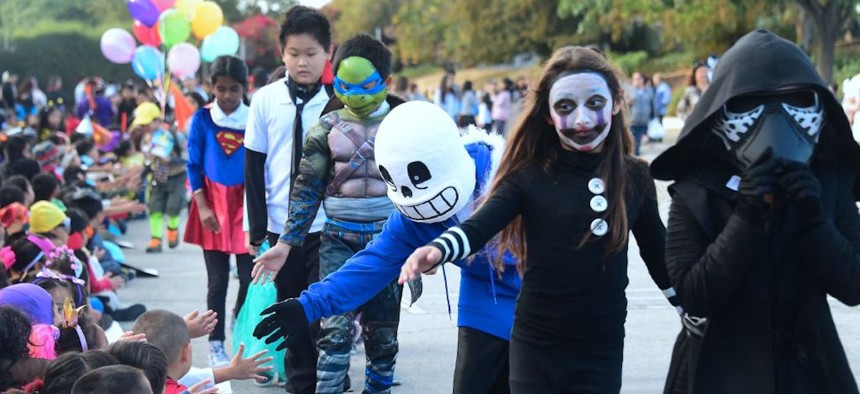Why some schools are halting Halloween celebrations

FREDERIC J. BROWN/AFP via Getty Images
Concerns that some students may feel excluded from Halloween celebrations has prompted some districts to move celebrations outside of school hours.
In schools across the country this Halloween, kids are parading down hallways dressed up as superheroes or skeletons or princesses and getting an early start on trick-or-treating. But students won’t be celebrating in some school districts this year, amid concerns that the spooktacular holiday could create unintentional financial or social pressure on families.
In the spirit of fostering more diversity, equity and inclusion in schools, one New Jersey school district recently ended school-sanctioned Halloween celebrations. This year, elementary students in the South Orange and Maplewood School District, or SOMSD, won’t be wearing costumes or marching in festive school parades, according to a press release.
“Each year, questions arise from families, students and staff about what SOMSD schools will be doing regarding Halloween. We believe it is important, moving forward, that we implement a consistent approach that is respectful and inclusive of all families,” superintendent Ronald Taylor said.
But shelving Halloween-themed activities was not a simple decision, Taylor wrote in a letter to SOMSD students and families. School officials considered three questions before issuing their policy, the first asking if school-sanctioned Halloween events create “indirect and unintentional hardships for students and families” who may not be able to afford costumes, for example.
Officials also considered if Halloween activities, such as wearing certain costumes, could be culturally or religiously insensitive. In recent years, for instance, observers have recommended avoiding outfits that could perpetuate cultural appropriation or stereotypes, like feather headdresses traditionally worn by indigenous people for cultural or spiritual reasons. Lastly, SOMSD authorities asked if promoting Halloween in school would go against the district’s equity and access values.
An internal survey found that most SOMSD principals were “overwhelming in favor of discontinuing” Halloween celebrations during school hours, according to officials. Instead, schools may host fall or harvest festivals with student activities centered on the autumn season.
The rule, however, does not apply to after-school festivities. Once the school day ends, schools may host Halloween celebrations, officials said.
“Often, working to instill greater equity in our district begins with recognizing that we cannot do what we have always done. But with this decision, we are taking a step closer to upholding our community’s access and equity values,” said Kevin Gilbert, SOMSD assistant superintendent of access and equity.
Halloween controversy has bubbled up in other schools, with one Boston-area superintendent proposing a policy like SOMSD’s. Gregory Martineau, superintendent of Northborough and Southborough Public Schools in Massachusetts, said about 120 students did not participate in last year’s Halloween parade in Northborough for various reasons, indicating a need to reconsider if Halloween should be a part of the school experience at all, the Boston Herald reported. Community pushback, however, led the district to quickly reverse its decision and allow costumes and Halloween parades after all.
In 2021, some Michigan principals called for the end of Halloween, and even Valentine’s Day, in schools out of concerns over the mocking or bullying of students who do not or cannot participate in the holidays. Some observers suggested that schools should collect costume donations for students who would like one, instead of prohibiting them entirely. And one Oregon elementary school has disallowed Halloween costumes since 2017, celebrating “Crazy Sock Day” instead.






